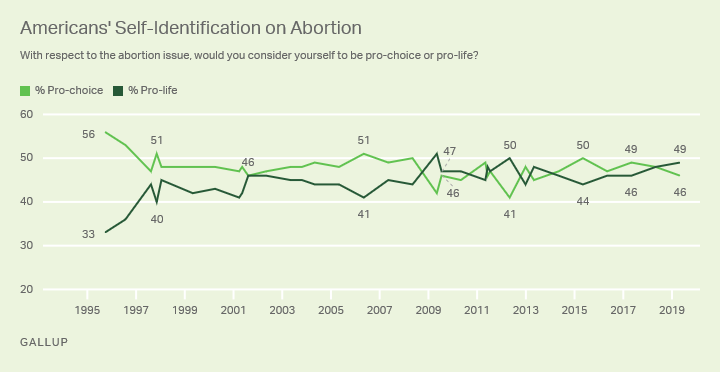And now, the newest installment in a series of data points definitively demonstrating that while Americans' views on abortion are complicated and often contradictory, the prevailing stance among nearly all elected Democrats and most media elites is profoundly out of step with the cultural mainstream. Gallup's latest national survey on the issue shows a slight plurality of US adults self-identifying as "pro-life" overall; in June 2019, 49 percent of respondents call themselves pro-life, with 46 percent identifying with the 'pro-choice' label, a direct reversal from 2017's poll. As you can see below, the two sides have toggled back and forth for years:

In another element of the new poll, a strong majority favors upholding Roe v. Wade. Just one-third of Americans believe the 1973 Supreme Court decision should be uprooted, with 60 percent saying that it should remain in place. Two notes on this, however. First, according to the Gallup numbers, the age demographic most open to overturning Roe (with a majority still opposed) are the youngest voters, aged 18 to 34. Second, and more important, when Americans are presented with options other than a stark uphold/overturn dichotomy, a majority emerges in favor of striking down or changing the current abortion precedent: "Forty-six percent of respondents said the high court should uphold the ruling in Roe if the issue comes before the justices, while 36 percent said the Supreme Court should modify the 46-year-old ruling. Eighteen percent wanted the ruling to be overturned altogether," a recent Harris/Harvard survey found.
That makes perfect sense, in light of the same poll's additional finding that 70 percent of Americans support restricting nearly all abortions sometime between the moment of conception and the end of the first trimester. In the June questionnaire, Gallup offered respondents four abortion policy preferences from which to choose. Fully six-in-ten said that the practice should be mostly or always illegal, a view almost universally described as "extreme" or "anti-women" by Democrats and journalists. In fact, as has consistently been the case, significant new abortion restrictions are very widely supported by the voting public:
Journalists: *Sixty* percent — 6-0 — of Americans say abortion should be rarely or never legal, according to Gallup. Do you cover this policy issue accordingly? And what does that percentage look like in your news room? https://t.co/BKJ3aSMgSm
— Guy Benson (@guypbenson) July 3, 2019
This information should impact coverage, yet it rarely does. There are few, if any, political issues on which mainstream newsrooms are more aggressively biased. Gallup's numbers show that most Americans are against the fetal heartbeat laws that have recently been implemented in a series of states, though the split is nearly even in the South, the region in which such laws have gained the most traction. These new regulations would bar most abortions after the unborn child's heartbeat is scientifically detected, early in the first trimester. Gallup data from 2018 indicated that a 60 percent majority of voters broadly believe first-trimester abortions should be mostly permitted.
But the number craters to just over one-quarter in the second trimester of pregnancy, and just 13 percent in the final trimester. In the aforementioned Harris/Harvard survey, a microscopic six percent of Americans believe abortion should be legal up to the moment of birth, which is the radical stance taken by nearly every Democrat running for president. I'll leave you with several technological confirmations that clearly-discernible human life begins in the womb:
Recommended
Cleveland Clinic successfully performed its first in utero fetal surgery to repair a spina bifida birth defect.https://t.co/ReH9nz32HQ pic.twitter.com/6YwT4mKHIF
— ClevelandClinicNews (@CleClinicNews) June 19, 2019
Clearest MRI of pregnancy ever recorded. This is crazy.pic.twitter.com/7IHJpxfrAQ
— Liz Wheeler (@Liz_Wheeler) June 28, 2019


